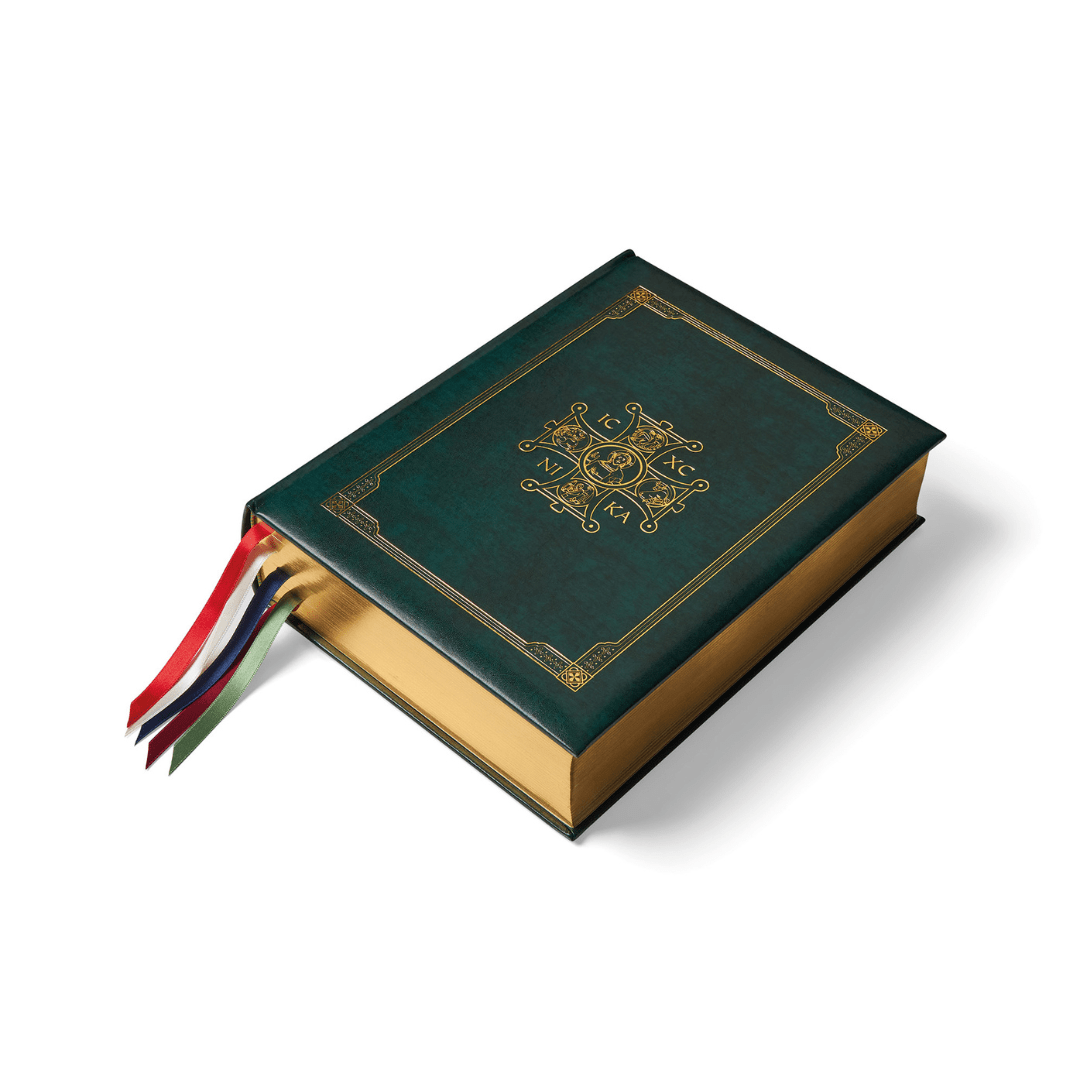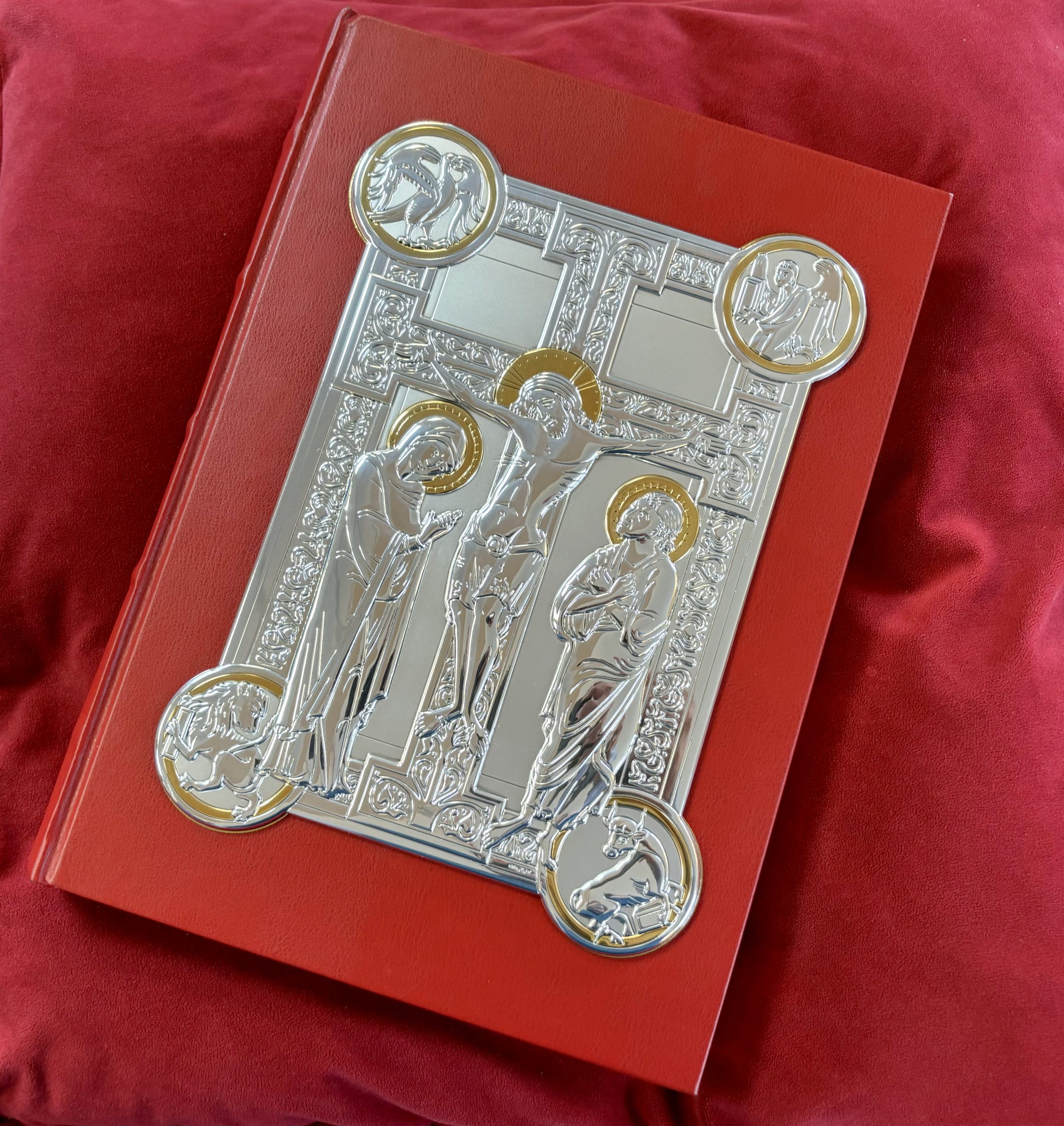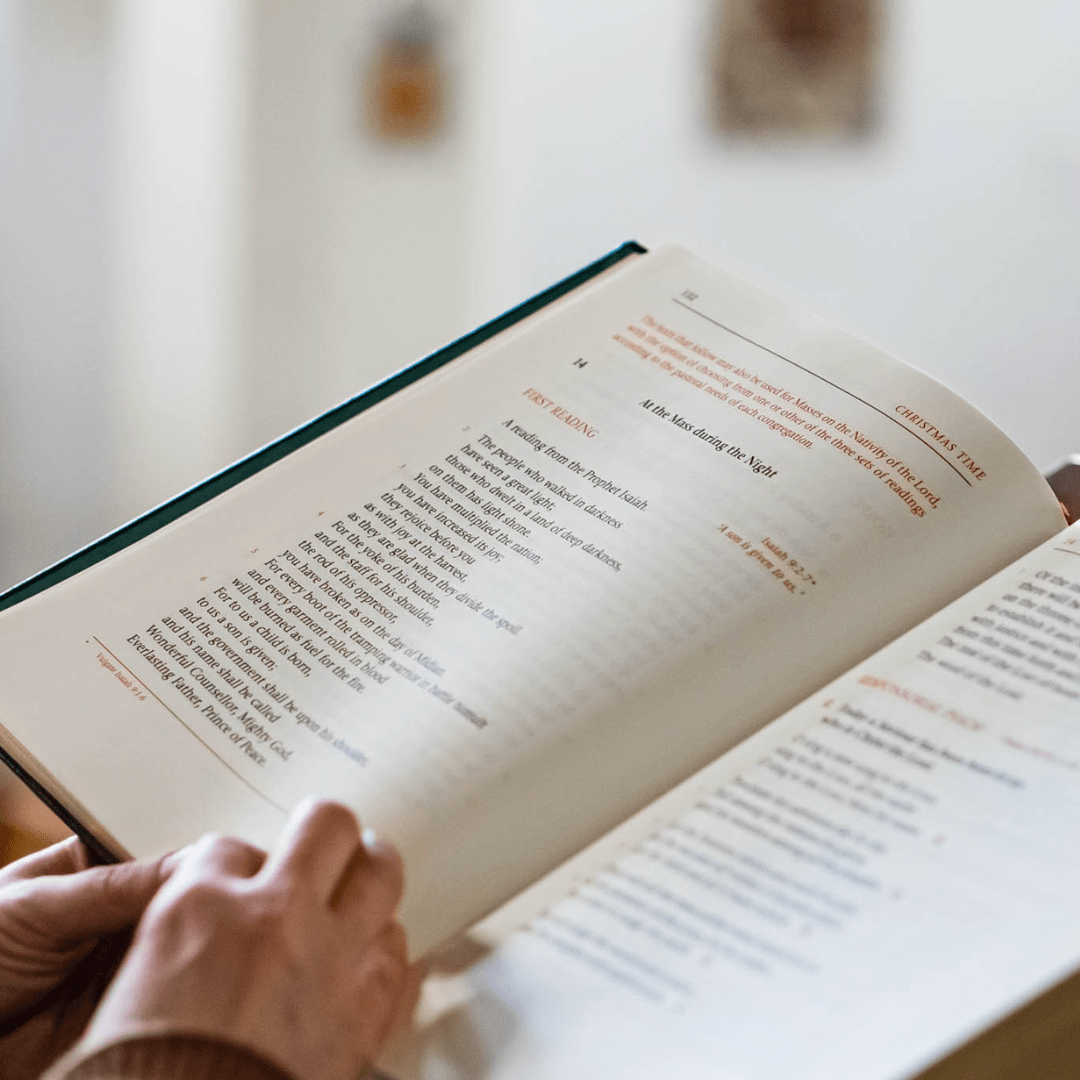
All Lectionary Products
In addition to the Lectionaries and the Book of the Gospels, we have People's Missals, booklets of the Gospels and Psalms, liturgical music, and resources for formation.
Find out more
Everything you need to know about the new Lectionary, for use from Advent 2024.
Are you interested in a publication not currently available for pre-order, including The Daily Missal? Please click here to be notified via email when it’s available to pre-order.
Have a query about the Lectionary? Check our FAQs below and then submit your query below.
Our Customer Services team are currently exceptionally busy dealing with a high number of orders and queries.
Please ensure your query is not answered below before submitting your query.
The lectionary is changing as part of the continuing process of revising liturgical translations. The process began with the Roman Missal in 2011 and has continued to work through all the other liturgical rites.
The changes are intended to make the biblical translations more faithful to the original languages, using better and more up-to-date biblical scholarship and to use a text which is more proclaimable.
The new lectionary will be using the English Standard Version – Catholic Edition of the Bible and the Abbey Psalter.
The changes are intended to make the biblical translations more faithful to the original languages, biblical scholarship, and to provide a text for use in liturgical setting that is more proclaimable and, where appropriate, more inclusive.
The new Lectionary will come into force on the first Sunday of Advent 2024, but parishes can start using it as soon as it arrives.
The Lectionary will be in stock in October 2024.
No, parishes will need to change over to the new Lectionary on 1st December 2024.
This version will be used in England and Wales, and Scotland.
CTS is also publishing ESV-CE Gospels, The Abbey Psalter Psalms and Canticles, new musical settings of the responsorial psalms, and explanatory and training texts for readers and the faithful. All products can be found here.
There will be no parish discount on the Lectionary, in order to keep costs of the item down. However, we are offering special pre-order discounts for orders placed by 30th June, which you can find here. While this pre-order discount offer lasts, there will be no parish discount on any of the items in the offer. The standard parish discount of 15% on booklets and 10% for larger items will apply to items excluding the Lectionary and the Book of the Gospels.
No. Your Altar Missal remains unchanged. However, People’s Missals will need to be replaced.
The lectionary will have a fully up-to-date Proper of Saints including the new universal and national feasts that have been instituted since the publication of the last lectionary. There are also important differences inside the Lectionary to make it more proclaimable – click here to learn more about these changes.
The ESV uses inclusive language only where it is faithful to the original language. This means that where the original language used male-gendered words to refer to both men and women, the ESV translators saw fit to make this more accurate for an English-speaking audience by changing it so that it is clearly understood to refer to both men and women.
For example, if the word “brothers” is used in the original language to address both men and women (but ONLY when it is used to address both men and women), the ESV translators changed it to “brothers and sisters” to retain the original meaning, since in the English language, unlike the original language, the word “brothers” is understood to refer only to men. This is considered to be “inclusive” in the sense that while the original language did not intend to exclude women by use of the word “brothers”, the English language interprets “brothers” to refer exclusively to men.
However, where male-gendered words were used to refer to men (for example, the Apostles) or God this has not been changed. Hence it remains faithful to the original language.
To help answer further questions about the translation of the ESV, CTS is making available to a UK audience Bible Translation and the Making of the ESV Catholic Edition, originally published in the United States by Augustine Institute. In this informative book, Mark Giszczak explains how the translation used in the new Lectionary was carried out and what it can teach us about the Word of God.
While the Order of Mass and other supplementary materials in your missal will stay the same, the translation of the readings in your current missal will no longer be the same. You can order new missals here.
The Daily Missal (which contains the readings for both Sunday Mass and Weekday Mass) is currently planned for early 2025. You can register your interest here to be notified via email when it’s available to order. If you would also be interested in a Weekday Missal, please register your interest as the more interest there is, the more likely we will decide to publish it in addition to the Daily Missal.
This is a new publication of the Lectionary using a different scripture translations — the content remains the same. So, for the reading for each Sunday will be the same.
There will be provision for Saints who have been added to the Universal Calendar since the last Lectionary published in 1981. There will also be the readings for the National Calendars. In addition, some of the revised liturgical rites, such as Marriage, have additional readings.
It is normal practice in the Roman Rite that there is only a single edition of a liturgical text in use in a particular territory. So in the same way as only the third edition of the Roman Missal (2010) may be used in the celebration of Mass (in the Ordinary Form); the same will be true for the Lectionary.
The Catholic Truth Society have been appointed publishers for the Lectionary. They are working closely with the bishops to ensure that the published volumes are worthy, clear in page layout, sturdy and reflect the daily needs of the liturgy.
The bishops of England and Wales completed their approval of the Lectionary text in 2018. The text was then submitted to the Holy See to be reviewed. The Lectionary will be published in good time for its first use in Advent 2024.
The current Lectionary (1981) is in three volumes. One significant change in the layout is that all the readings will be given in sense lines as an assistance to the reader. This is recommended in the Introduction to the Lectionary and is common to most recent publications of the Lectionary. The effect is that readings do require more space and this means more pages.
The new Lectionary will be in four volumes: one for Sundays and Solemnities, two volumes for Weekdays and the Proper of Saints, a final volume with Ritual Masses, Masses for the Dead etc.
In the Liturgy the Missal can refer to three distinct but related things. To many people the most familiar meaning is a peoples’ Missal – either for Sundays or weekdays.
To understand the other two meanings, it is easiest to take a step away. The various books of the Roman Rite (for the celebration of Sacraments etc.) are grouped together. Those rites which are primarily celebrated by the Bishop (such as Ordination) are part of the Roman Pontifical. The two books for the celebration of Mass form the Roman Missal, one of these, which contains the readings is the Lectionary, the other, which contains the prayers, is the Missal.
Many people have a Sunday or Weekday Missal to either prepare the readings or to reflect on them. Some also use it to follow the text which is proclaimed in the liturgy. As the new Lectionary will use a different translation of the scriptures people will wish to get a new Sunday or Weekday Missal.
The English Standard Version is the latest in a series of English translations which go back to the 16th Century. These translations have all been based on a ‘word for word’ principle. The ESV is directly based on the Revised Standard Version and it is suggested that c. 6% of the text has been revised. Changes were made to modernise the language and reflect the latest scholarship. The publisher Crossway emphasises ‘word-for-word’ accuracy, literary excellence, and depth of meaning. Work on the Catholic Edition was done by the Catholic Bishops’ Conference of India in collaboration with Crossway.
The Grail Psalms have been part of Liturgy in English since before the Second Vatican Council. They are used in both the Lectionary and the Divine Office.
In 2008 a revision of the text was undertaken by the monks of Conception Abbey, Missouri. It sought to bring the latest scholarly understanding of the text and to review the text where the English was essentially a paraphrase of the Hebrew. This text was approved by the United States Conference of Catholic Bishops (USCCB) in 2010. A further revision in the light of use was prepared and approved both by USCCB and CBCEW, and has received the confirmatio of the Holy See. This text is now owned by USCCB who have renamed it Abbey Psalms and Canticles both in recognition of the work of Conception Abbey and also so that there was clarity about the edition being used. This text will be used in the Lectionary and in subsequent liturgical books, such as the Liturgy of the Hours.
The International Commission on English in the Liturgy (ICEL) is responsible for translating the Latin liturgical texts for the English-speaking Bishops’ Conferences. It was approached by USCCB to assist in a new translation of the Liturgy of the Hours. Broadly this work can be divided into three areas: Psalms and Canticles; Scripture and scripture based texts; other texts.
The Abbey Psalms and Canticles will provide the first area. Other texts are being translated by ICEL — these include the hymns, many of which have not been available before, and the intercessions. This vast project has been in progress for a number of years with the Bishops of England and Wales receiving, commenting and voting on the material which has been prepared by ICEL. There is not currently an estimated date for publication.

In addition to the Lectionaries and the Book of the Gospels, we have People's Missals, booklets of the Gospels and Psalms, liturgical music, and resources for formation.
Find out more
A small number of products are not yet ready for pre-order and may only be published if there is enough demand. We'll notify you via email when/if they become available to order.
Find out more
What's changed in the new Lectionary? In addition to the new translation, updates have been made to the way the text has been formatted, the proper of the saints has been updated, and further changes have also been made.
Find out more